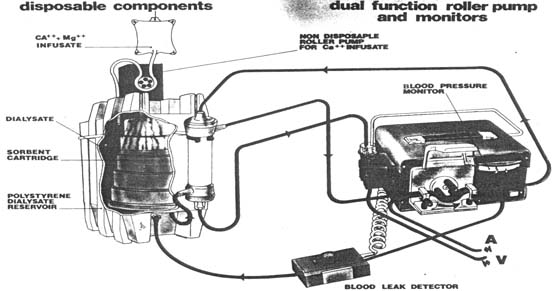Electrolyte Disorders Treatment in India

Definition
An electrolyte disorder is an imbalance of certain ionized salts (i.e., bicarbonate, calcium, chloride, magnesium, phosphate, potassium, and sodium) in the blood.
Description
Electrolytes are ionized molecules found throughout the blood, tissues, and cells of the body. These molecules, which are either positive (cations) or negative (anions), conduct an electric current and help to balance pH and acid-base levels in the body. Electrolytes also facilitate the passage of fluid between and within cells through a process known as osmosis and play a part in regulating the function of the neuromuscular, endocrine, and excretory systems.
The serum electrolytes include:
- Sodium (Na) A positively charged electrolyte that helps to balance fluid levels in the body and facilitates neuromuscular functioning.
- Potassium (K) A main component of cellular fluid, this positive electrolyte helps to regulate neuromuscular function and osmotic pressure.
- Calcium (Ca) A cation, or positive electrolyte, that affects neuromuscular performance and contributes to skeletal growth and blood coagulation.
- Magnesium (Mg) Influences muscle contractions and intracellular activity. A cation.
- Chloride (CI) An anion, or negative electrolyte, that regulates blood pressure.
- Phosphate (HPO4) Negative electrolyte that impacts metabolism and regulates acid-base balance and calcium levels.
- Bicarbonate (HCO3) A negatively charged electrolyte that assists in the regulation of blood pH levels. Bicarbonate insufficiencies and elevations cause acid-base disorders (i.e., acidosis, alkalosis).
Medications, chronic diseases, and trauma (for example, burns, or fractures etc.) may cause the concentration of certain electrolytes in the body to become too high (hyper-) or too low (hypo-). When this happens, an electrolyte imbalance, or disorder, results.
Causes and symptoms
Sodium
HYPERNATREMIA
Sodium helps the kidneys to regulate the amount of water the body retains or excretes. Consequently, individuals with elevated serum sodium levels also suffer from a loss of fluids, or dehydration. Hypernatremia can be caused by inadequate water intake, excessive fluid loss (i.e., diabetes insipidus, kidney disease, severe burns, and prolonged vomiting or diarrhea), or sodium retention (caused by excessive sodium intake or aldosteronism). In addition, certain drugs, including loop diuretics, corticosteroids, and antihypertensive medications may cause elevated sodium levels.
Symptoms of hypernatremia include:
- thirst
- orthostatic hypotension
- dry mouth and mucous membranes
- dark, concentrated urine
- loss of elasticity in the skin
- irregular heartbeat (tachycardia)
- irritability
- fatigue
- lethargy
- heavy, labored breathing
- muscle twitching and/or seizures
HYPONATREMIA
Up to 1% of all hospitalized patients and as many as 18% of nursing home patients develop hyponatremia, making it one of the most common electrolyte disorders. A 2004 study questioned the routine make-up of fluids prescribed for children and delivered intravenously (through a needle into a vein) in hospitals today. The authors recommended only using IV fluids when necessary and then using isotonic saline. Diuretics, certain psychoactive drugs (i.e., fluoxetine, sertraline, haloperidol), specific antipsychotics (lithium), vasopressin, chlorpropamide, the illicit drug "ecstasy," and other pharmaceuticals can cause decreased sodium levels, or hyponatremia. Low sodium levels may also be triggered by inadequate dietary intake of sodium, excessive perspiration, water intoxication, and impairment of adrenal gland or kidney function.
Symptoms of hyponatremia include:
- nausea, abdominal cramping, and/or vomiting
- headache
- edema (swelling)
- muscle weakness and/or tremor
- paralysis
- disorientation
- slowed breathing
- seizures
- coma
- Potassium
HYPERKALEMIA
Hyperkalemia may be caused by ketoacidosis (diabetic coma), myocardial infarction (heart attack), severe burns, kidney failure, fasting, bulimia nervosa, gastrointestinal bleeding, adrenal insufficiency, or Addison's disease. Diuretic drugs, cyclosporin, lithium, heparin, ACE inhibitors, beta blockers, and trimethoprim can increase serum potassium levels, as can heavy exercise. The condition may also be secondary to hypernatremia (low serum concentrations of sodium). Symptoms may include:
- weakness
- nausea and/or abdominal pain
- irregular heartbeat (arrhythmia)
- diarrhea
- muscle pain
HYPOKALEMIA
Severe dehydration, aldosteronism, Cushing's syndrome, kidney disease, long-term diuretic therapy, certain penicillins, laxative abuse, congestive heart failure, and adrenal gland impairments can all cause depletion of potassium levels in the bloodstream. A substance known as glycyrrhetinic acid, which is found in licorice and chewing tobacco, can also deplete potassium serum levels. Symptoms of hypokalemia include:
- weakness
- paralysis
- increased urination
- irregular heartbeat (arrhythmia)
- orthostatic hypotension
- muscle pain
- tetany
- Calcium
HYPERCALCEMIA
Blood calcium levels may be elevated in cases of thyroid disorder, multiple myeloma, metastatic cancer, multiple bone fractures, milk-alkali syndrome, and Paget's disease. Excessive use of calcium-containing supplements and certain over-the-counter medications (i.e., antacids) may also cause hypercalcemia. In infants, lesser known causes may include blue diaper syndrome, Williams syndrome, secondary hyperparathyroidism from maternal hypocalcemia, and dietary phosphate deficiency. Symptoms include:
- fatigue
- constipation
- depression
- confusion
- muscle pain
- nausea and vomiting
- dehydration
- increased urination
- irregular heartbeat (arrhythmia)
HYPOCALCEMIA
Thyroid disorders, kidney failure, severe burns, sepsis, vitamin D deficiency, and medications such as heparin and glucogan can deplete blood calcium levels. Lowered levels cause:
- muscle cramps and spasms
- tetany and/or convulsions
- mood changes (depression, irritability)
- dry skin
- brittle nails
- facial twitching
- Magnesium
HYPERMAGNESEMIA
Excessive magnesium levels may occur with end-stage renal disease, Addison's disease, or an overdose of magnesium salts. Hypermagnesemia is characterized by:
- lethargy
- hypotension
- decreased heart and respiratory rate
- muscle weakness
- diminished tendon reflexes
HYPOMAGNESEMIA
Inadequate dietary intake of magnesium, often caused by chronic alcoholism or malnutrition, is a common cause of hypomagnesemia. Other causes include malabsorption syndromes, pancreatitis, aldosteronism, burns, hyperparathyroidism, digestive system disorders, and diuretic use. Symptoms of low serum magnesium levels include:
- leg and foot cramps
- weight loss
- vomiting
- muscle spasms, twitching, and tremors
- seizures
- muscle weakness
- arrthymia
- Chloride
HYPERCHLOREMIA
Severe dehydration, kidney failure, hemodialysis, traumatic brain injury, and aldosteronism can also cause hyperchloremia. Drugs such as boric acid and ammonium chloride and the intravenous (IV) infusion of sodium chloride can also boost chloride levels, resulting in hyperchloremic metabolic acidosis. Symptoms include:
- weakness
- headache
- nausea
- cardiac arrest
HYPOCHLOREMIA
Hypochloremia usually occurs as a result of sodium and potassium depletion (i.e., hyponatremia, hypokalemia). Severe depletion of serum chloride levels causes metabolic alkalosis. This alkalization of the bloodstream is characterized by:
- mental confusion
- slowed breathing
- paralysis
- muscle tension or spasm
- Phosphate
HYPERPHOSPHATEMIA
Skeletal fractures or disease, kidney failure, hypoparathyroidism, hemodialysis, diabetic ketoacidosis, acromegaly, systemic infection, and intestinal obstruction can all cause phosphate retention and build-up in the blood. The disorder occurs concurrently with hypocalcemia. Individuals with mild hyperphosphatemia are typically asymptomatic, but signs of severe hyperphosphatemia include:
- tingling in hands and fingers
- muscle spasms and cramps
- convulsions
- cardiac arrest
HYPOPHOSPHATEMIA
Serum phosphate levels of 2 mg/dL or below may be caused by hypomagnesemia and hypokalemia. Severe burns, alcoholism, diabetic ketoacidosis, kidney disease, hyperparathyroidism, hypothyroidism, Cushing's syndrome, malnutrition, hemodialysis, vitamin D deficiency, and prolonged diuretic therapy can also diminish blood phosphate levels. There are typically few physical signs of mild phosphate depletion. Symptoms of severe hypophosphatemia include:
- muscle weakness
- weight loss
- bone deformities (osteomalacia)
- Diagnosis
Diagnosis is performed by a physician or other qualified healthcare provider who will take a medical history, discuss symptoms, perform a complete physical examination, and prescribe appropriate laboratory tests. Because electrolyte disorders commonly affect the neuromuscular system, the provider will test reflexes. If a calcium imbalance is suspected, the physician will also check for Chvostek's sign, a reflex test that triggers an involuntary facial twitch, and Trousseau's sign, a muscle spasm that occurs in response to pressure on the upper arm.
Serum electrolyte imbalances can be detected through blood tests. Blood is drawn from a vein on the back of the hand or inside of the elbow by a medical technician, or phlebotomist, and analyzed at a lab.
Normal levels of electrolytes are:
- Sodium. 135-145 mEq/L (serum)
- Potassium. 3.5-5.5 mEq/L (serum)
- Calcium. 8.8-10.4 mg/dL (total Ca; serum); 4.7-5.2 mg/dL (unbound Ca; serum)
- Magnesium. 1.4-2.1 mEq/L (plasma)
- Chloride. 100-108 mEq/L (serum)
- Phosphate. 2.5-4.5 mg/dL (plasma; adults)
Standard ranges for test results may vary due to differing laboratory standards and physiological variances (gender, age, and other factors). Other blood tests that determine pH levels and acid-base balance may also be performed.
Treatment
Treatment of electrolyte disorders depends on the underlying cause of the problem and the type of electrolyte involved. If the disorder is caused by poor diet or improper fluid intake, nutritional changes may be prescribed. If medications such as diuretics triggered the imbalance, discontinuing or adjusting the drug therapy may effectively treat the condition. Fluid and electrolyte replacement therapy, either intravenously or by mouth, can reverse electrolyte depletion.
Hemodialysis treatment may be required to reduce serum potassium levels in hyperkalemic patients with impaired kidney function. It may also be recommended for renal patients suffering from severe hypermagnesemia.
Prognosis
A patient's long-term prognosis depends upon the root cause of the electrolyte disorder. However, when treated quickly and appropriately, electrolyte imbalances in and of themselves are usually effectively reversed.
When they are mild, some electrolyte imbalances have few to no symptoms and may pass unnoticed. For example, transient hyperphosphatemia is usually fairly benign. However, long-term elevations of blood phosphate levels can lead to potentially fatal soft tissue and vascular calcifications and bone disease, and severe serum phosphate deficiencies (hypophosphatemia) can cause encephalopathy, coma, and death.
Severe hypernatremia has a mortality rate of 40-60%. Death is commonly due to cerebrovascular damage and hemorrhage resulting from dehydration and shrinkage of the brain cells.
Prevention
Physicians should use caution when prescribing drugs known to affect electrolyte levels and acid-base balance. Individuals with kidney disease, thyroid problems, and other conditions that may place them at risk for developing an electrolyte disorder should be educated on the signs and symptoms.
Electrolyte Disorders Treatment in India is available in following cities
| Mumbai | Hyderabad | Kerala |
| Delhi | Pune | Goa |
| Bangalore | Nagpur | Jaipur |
| Chennai | Gurgaon | Chandigarh |
Go to the Enquiry Form
Phone Numbers Reach Us
India & International : +91-9860755000 / +91-9371136499
UK : +44-2081332571
Canada & USA : +1-4155992537
Below are the downloadable links that will help you to plan your medical trip to India in a more organized and better way. Attached word and pdf files gives information that will help you to know India more and make your trip to India easy and memorable one.
 Apollo Hospital
Apollo Hospital Fortis Hospital
Fortis Hospital Artemis Hospital
Artemis Hospital
 Medanta Hospital
Medanta Hospital



 Jaslok Hospital
Jaslok Hospital Lilavati Hospital
Lilavati Hospital

 Global Hospitals
Global Hospitals Jupiter Hospital
Jupiter Hospital













